13 Best Herbal Tinctures For Uterine Fibroids
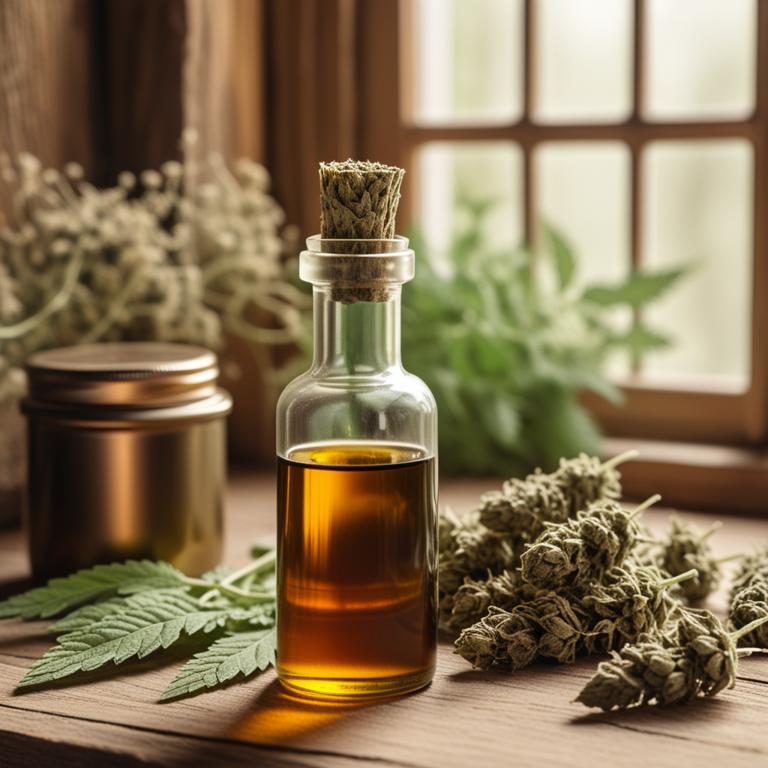
Herbal tinctures for Uterine fibroids are highly concentrated liquid extracts derived from various plants and herbs, used to alleviate symptoms and potentially treat this condition.
The benefits of using herbal tinctures to treat uterine fibroids include reducing pain, heavy bleeding, and promoting hormonal balance.
Examples of herbal tinctures that may be beneficial in treating uterine fibroids include Red Clover, which is rich in isoflavones that help to balance estrogen levels, and Vitex Agnus-Castus, also known as Chasteberry, which may help to regulate menstrual cycles and reduce fibroid symptoms.
Other herbal tinctures that may be used to treat uterine fibroids include Wild Yam, Dong Quai, and Blue cohosh, which have anti-inflammatory and anti-spasmodic properties that may help to reduce pain and heavy bleeding.
According to "Yakugaku zasshi : Journal of the Pharmaceutical Society of Japan", tinctures for uterine fibroids, specifically Toki-shakuyaku-san, a Sino-Japanese traditional herbal medicine, may be useful for resolving the symptoms of mild or moderate anemia associated with uterine fibroids.
Below there's a list of the 13 best herbal tinctures for uterine fibroids.
- 1. Vitex agnus-castus tinctures
- 2. Tribulus terrestris tinctures
- 3. Vernonia amygdalina tinctures
- 4. Ruscus aculeatus tinctures
- 5. Ginkgo biloba tinctures
- 6. Silybum marianum tinctures
- 7. Cynara scolymus tinctures
- 8. Trifolium pratense tinctures
- 9. Morus alba tinctures
- 10. Aloe barbadensis tinctures
- 11. Sambucus nigra tinctures
- 12. Equisetum arvense tinctures
- 13. Lavandula angustifolia tinctures
Also you may be interested in...
TODAY'S FREE BOUNDLE
Herb Drying Checklist + Herbal Tea Shopping List + Medicinal Herbs Flashcards
Enter you best email address below to receive this bundle (3 product valued $19.95) for FREE + exclusive access to The Aphotecary Letter.
$19.95 -> $0.00
1. Vitex agnus-castus tinctures
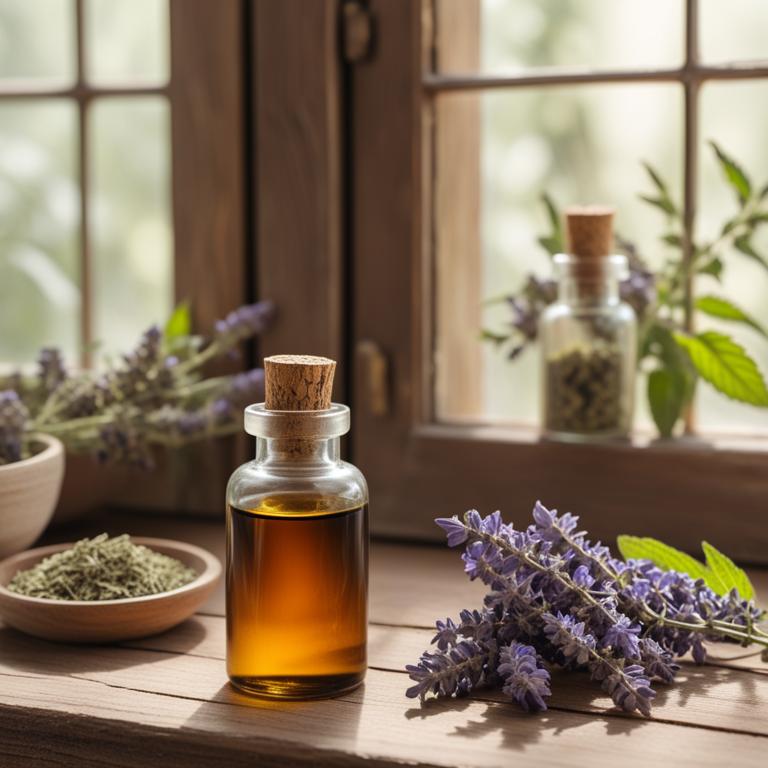
Vitex agnus-castus tinctures have been traditionally used to treat uterine fibroids, a common gynecological issue characterized by non-cancerous growths in the uterus.
The bioactive constituents of this herbal preparation, including flavonoids, iridoid glycosides, and phenolic acids, exhibit anti-inflammatory and antioxidant properties that help to alleviate symptoms associated with uterine fibroids.
By regulating hormonal imbalances and modulating the pituitary-gonadal axis, Vitex agnus-castus tinctures may help to reduce the size and number of fibroids, thereby alleviating symptoms such as heavy menstrual bleeding and pelvic pain.
The benefits of using Vitex agnus-castus tinctures to treat uterine fibroids include reduced symptoms, improved quality of life, and a natural alternative to conventional treatments.
Related Study
According to "Environmental science and pollution research international", Vitex agnus-castus tinctures for uterine fibroids may help mitigate the adverse effects of xylene on ovarian cells by preventing xylene's action on cell viability, cell proliferation, and the release of progesterone and estradiol.
2. Tribulus terrestris tinctures
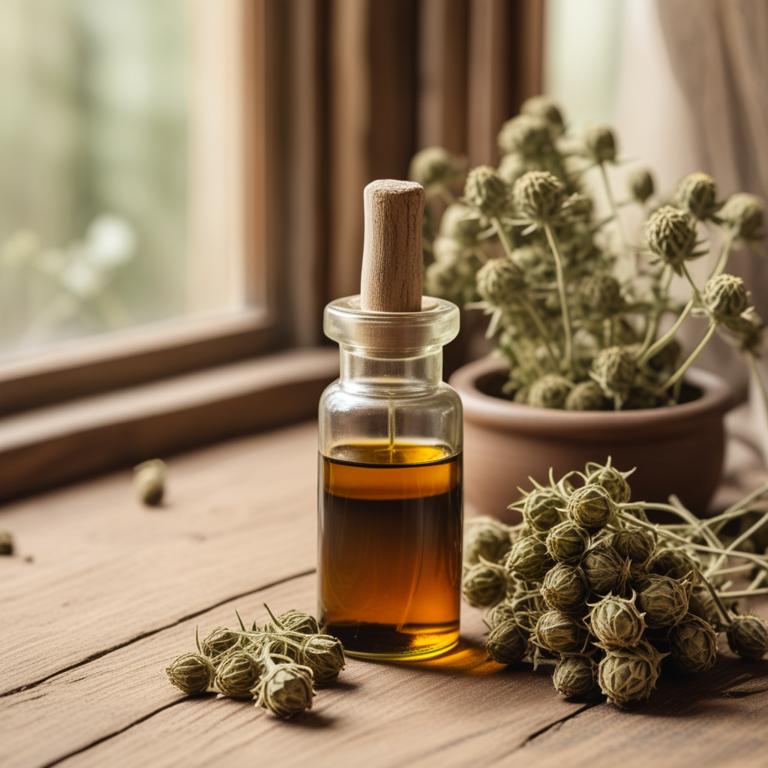
Tribulus terrestris tinctures have been traditionally used to treat uterine fibroids due to their anti-inflammatory, antispasmodic, and estrogen-modulating properties.
The bioactive constituents of Tribulus terrestris, including alkaloids, glycosides, and flavonoids, help to reduce fibroid size and alleviate symptoms such as heavy menstrual bleeding and pelvic pain.
By inhibiting the growth of fibroid cells and promoting the regression of existing fibroids, Tribulus terrestris tinctures may help to shrink uterine fibroids and improve overall health.
The benefits of using Tribulus terrestris tinctures to treat uterine fibroids include reduced symptoms, improved fertility, and a potential reduction in the need for surgical intervention.
3. Vernonia amygdalina tinctures

Vernonia amygdalina tinctures have been traditionally used to treat uterine fibroids due to their anti-inflammatory, antispasmodic, and antioxidant properties.
The bioactive constituents present in Vernonia amygdalina, such as flavonoids, phenolic acids, and terpenoids, have been shown to inhibit the growth of fibroid cells and alleviate symptoms associated with uterine fibroids.
The tincture's ability to reduce inflammation and relax the uterine muscles helps to alleviate menstrual cramps, heavy bleeding, and other discomforts associated with uterine fibroids.
By using Vernonia amygdalina tinctures, women may experience benefits such as reduced fibroid size, improved menstrual cycle regulation, and overall improvement in their quality of life.
4. Ruscus aculeatus tinctures
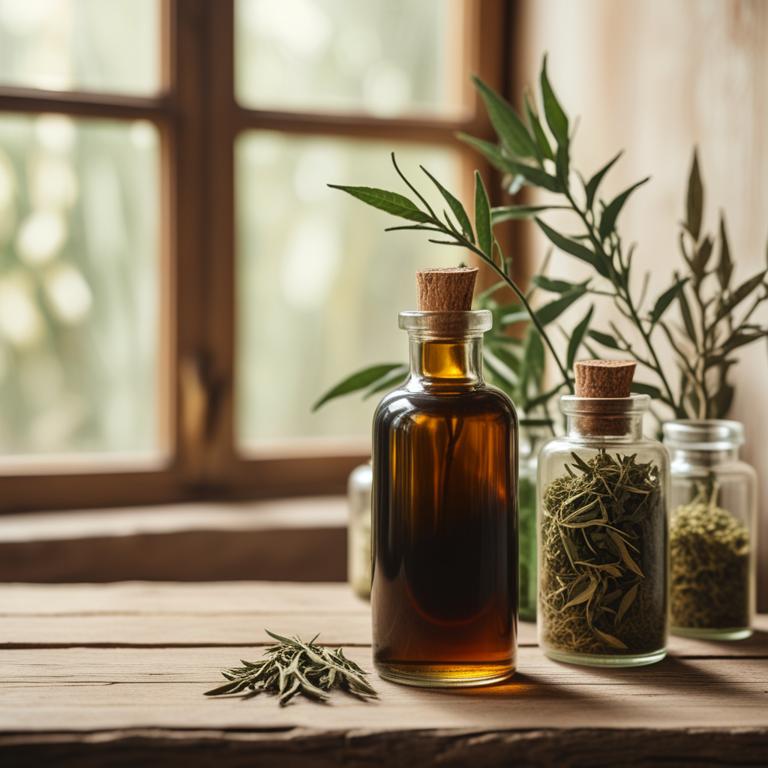
Ruscus aculeatus tinctures have been used in traditional medicine to treat uterine fibroids, a common gynecological condition characterized by the growth of non-cancerous tumors in the uterus.
The tinctures exhibit anti-inflammatory, antispasmodic, and antioxidant properties that help to alleviate symptoms associated with fibroids, such as heavy menstrual bleeding, pelvic pain, and discomfort.
The bioactive constituents of Ruscus aculeatus, including flavonoids, phenolic acids, and saponins, are believed to contribute to its therapeutic effects by modulating hormonal activity, reducing inflammation, and improving circulation, ultimately helping to shrink or stabilize fibroid growth.
By using Ruscus aculeatus tinctures, women may experience relief from fibroid-related symptoms, improved menstrual regularity, and enhanced overall uterine health.
5. Ginkgo biloba tinctures

Ginkgo biloba tinctures have been studied for their potential benefits in treating uterine fibroids, a condition characterized by non-cancerous growths in the uterus.
The bioactive constituents of Ginkgo biloba, such as flavonoids and terpenoids, have anti-inflammatory and antioxidant properties that may help alleviate symptoms associated with uterine fibroids, including pain and heavy menstrual bleeding.
These constituents may also help to improve blood flow to the uterus, reducing the size of fibroids and alleviating pressure on surrounding tissues.
Regular use of Ginkgo biloba tinctures may provide relief from uterine fibroid symptoms, improve overall health, and reduce the need for surgical intervention.
6. Silybum marianum tinctures
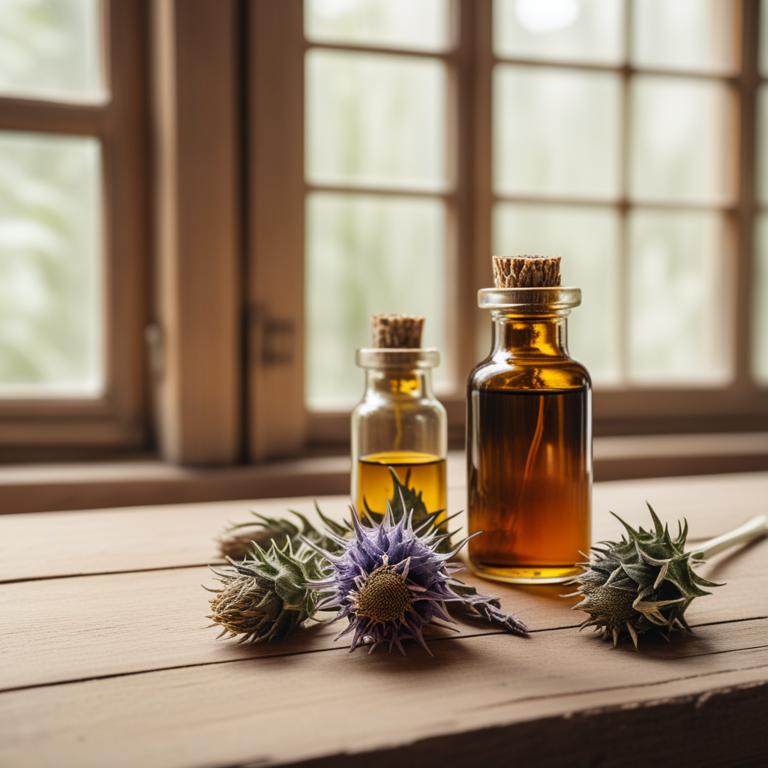
Silybum marianum tinctures, derived from the milk thistle plant, have been used in traditional medicine to treat uterine fibroids.
The tannins, flavonoids, and silymarin present in this herbal preparation exhibit anti-inflammatory, antioxidant, and antifibrotic properties that help to reduce the growth and size of fibroids.
By modulating the expression of genes involved in fibrosis and inhibiting the production of pro-inflammatory cytokines, Silybum marianum tinctures may help alleviate symptoms associated with uterine fibroids, such as heavy menstrual bleeding and pelvic pressure.
The bioactive constituents of Silybum marianum, including silybin and isosilybin, may also help to protect the body from oxidative stress and promote the regeneration of damaged tissues, ultimately reducing the severity of uterine fibroids and improving the overall quality of life.
7. Cynara scolymus tinctures
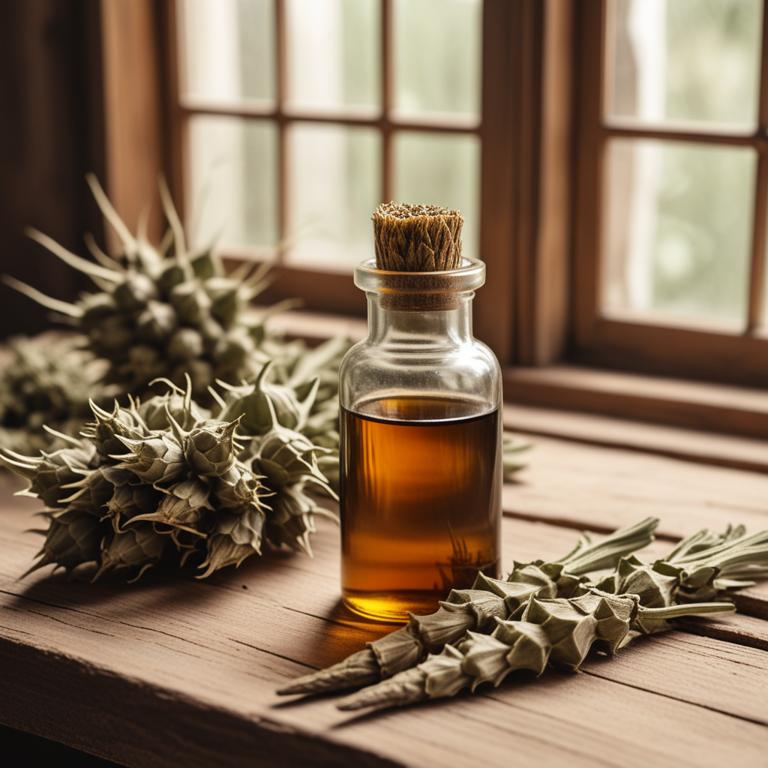
Cynara scolymus tinctures have been traditionally used to treat uterine fibroids, a common gynecological condition characterized by non-cancerous growths in the uterus.
The antiproliferative and anti-estrogenic properties of Cynara scolymus tinctures help to reduce the growth and size of fibroids, while also alleviating symptoms such as heavy menstrual bleeding and pelvic pain.
The bioactive constituents of Cynara scolymus tinctures, including flavonoids, saponins, and sesquiterpenes, are responsible for its therapeutic effects, which include inhibiting cell proliferation and inducing apoptosis in fibroid cells.
The benefits of using Cynara scolymus tinctures to treat uterine fibroids include reduced fibroid size, improved menstrual regularity, and alleviation of associated symptoms, making it a potential natural remedy for this condition.
8. Trifolium pratense tinctures
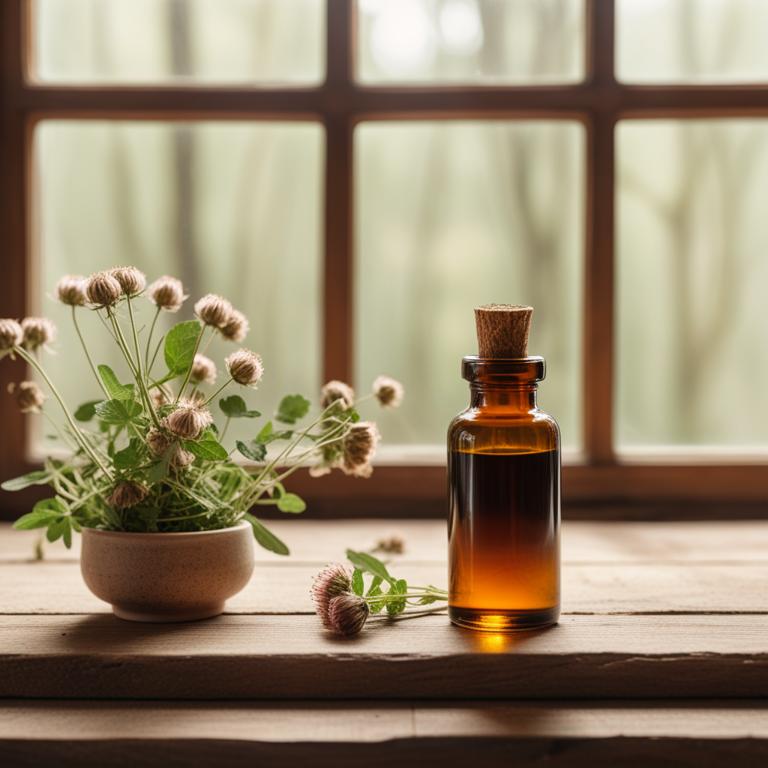
Trifolium pratense tinctures have been traditionally used to treat uterine fibroids, a common gynecological condition characterized by non-cancerous growths in the uterus.
The tinctures' anti-inflammatory and antispasmodic properties help to reduce symptoms such as heavy menstrual bleeding and pelvic pain, providing relief to individuals suffering from this ailment.
The bioactive constituents of Trifolium pratense, including flavonoids, phenolic acids, and saponins, have been shown to exhibit estrogen-modulating activity, which may help to shrink fibroid tumors and alleviate symptoms.
Regular use of Trifolium pratense tinctures may also promote hormonal balance, reduce inflammation, and support overall uterine health, making it a potential natural remedy for treating uterine fibroids.
9. Morus alba tinctures

Morus alba tinctures, derived from the bark of the white mulberry tree, have been studied for their potential in treating uterine fibroids due to their anti-inflammatory and antiproliferative properties.
The bioactive constituents, including flavonoids and alkaloids, in Morus alba tinctures may help to reduce fibroid growth and alleviate symptoms by modulating hormonal imbalances and improving blood circulation to the uterus.
Research suggests that Morus alba tinctures may also have a beneficial effect on the immune system, reducing oxidative stress and promoting cellular health, which can contribute to the regression of fibroid growth.
The benefits of using Morus alba tinctures to treat uterine fibroids include reduced symptoms, improved quality of life, and potentially, a decrease in the need for surgical intervention.
10. Aloe barbadensis tinctures
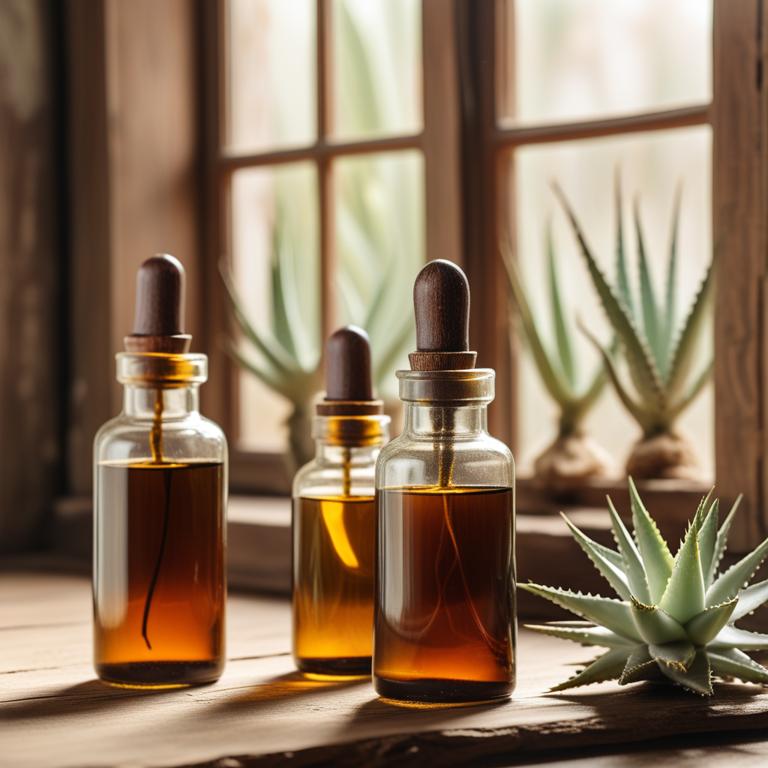
Aloe barbadensis tinctures have been studied for their potential to treat uterine fibroids, a common gynecological condition characterized by the growth of non-cancerous tumors in the uterus.
The anti-inflammatory and antispasmodic properties of this herbal preparation help to alleviate symptoms such as heavy menstrual bleeding and pelvic pain, thereby providing relief to individuals suffering from this ailment.
The bioactive constituents of Aloe barbadensis tinctures, including aloin, aloe-emodin, and acemannan, are believed to contribute to its therapeutic effects, with aloin having been shown to inhibit the growth of fibroid cells and aloe-emodin exhibiting anti-proliferative properties.
By using Aloe barbadensis tinctures, individuals may experience benefits such as reduced fibroid size, decreased menstrual bleeding, and improved overall quality of life, making it a promising natural remedy for the treatment of uterine fibroids.
11. Sambucus nigra tinctures
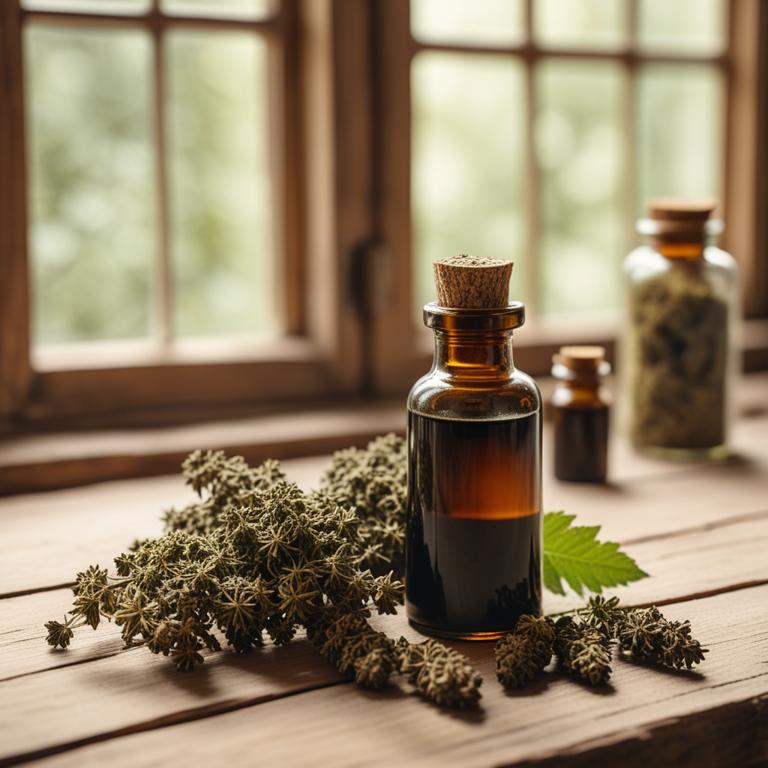
Sambucus nigra tinctures have been traditionally used to treat uterine fibroids, a common gynecological condition characterized by non-cancerous growths in the uterus.
The antiproliferative and anti-inflammatory properties of Sambucus nigra tinctures help to reduce the growth and alleviate symptoms associated with uterine fibroids, such as heavy menstrual bleeding and pelvic pain.
The bioactive constituents of Sambucus nigra, including flavonoids and saponins, have been found to inhibit the proliferation of uterine fibroid cells and reduce vascular endothelial growth factor (VEGF) levels, contributing to their therapeutic effects.
The benefits of using Sambucus nigra tinctures to treat uterine fibroids include reduced symptoms, improved quality of life, and a natural alternative to conventional treatments.
12. Equisetum arvense tinctures
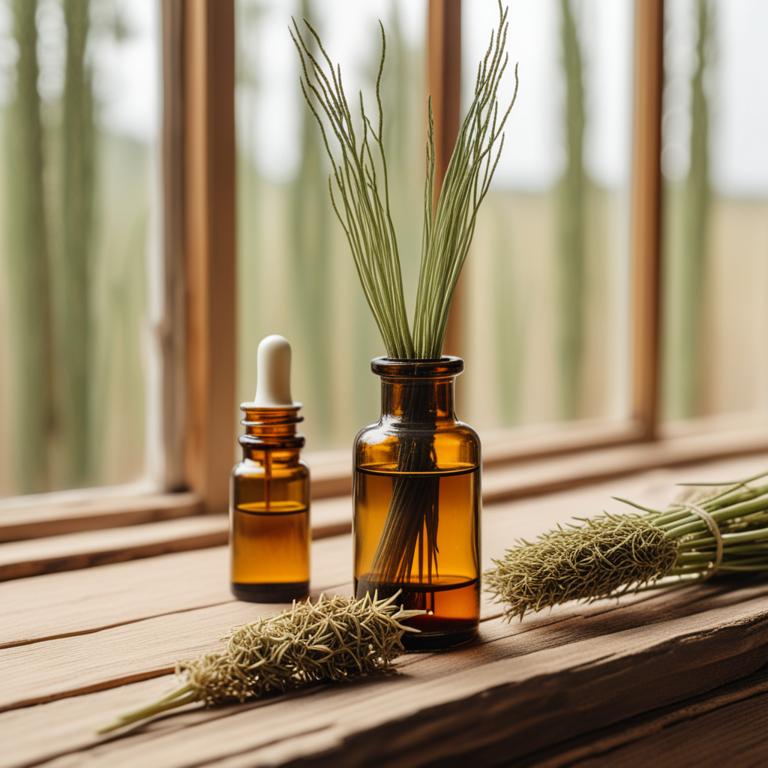
Equisetum arvense tinctures have been traditionally used to treat uterine fibroids due to their anti-inflammatory, antispasmodic, and astringent properties.
The bioactive constituents, such as flavonoids and saponins, help to reduce the growth of fibroids and alleviate symptoms such as heavy menstrual bleeding and pelvic pressure.
Equisetum arvense tinctures may help to treat uterine fibroids by reducing inflammation and promoting a balance of hormonal activity, which can contribute to the development and growth of fibroids.
The benefits of using Equisetum arvense tinctures to treat uterine fibroids include reduced symptoms, improved quality of life, and a potential reduction in the need for surgical intervention.
13. Lavandula angustifolia tinctures
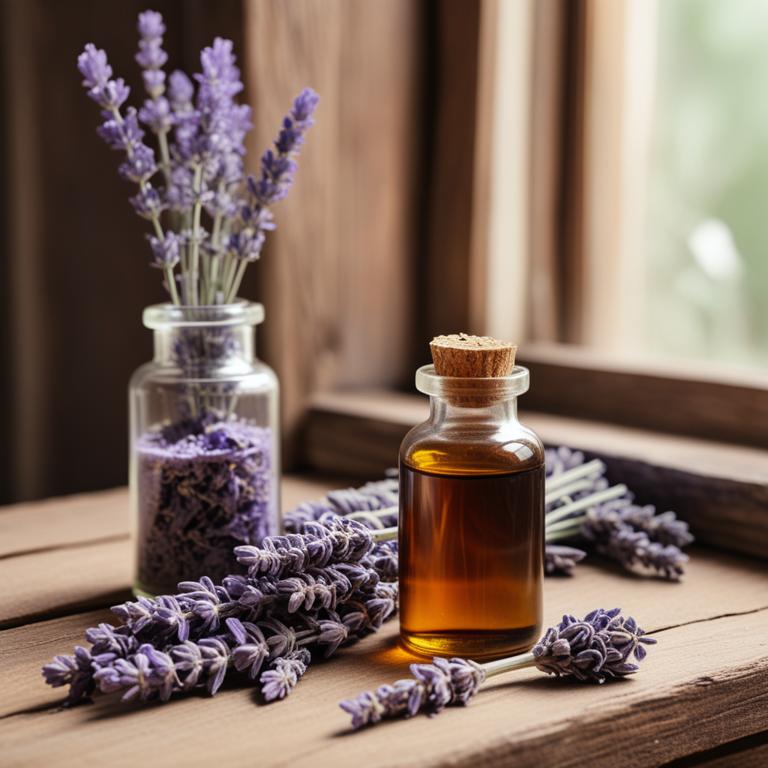
Lavandula angustifolia tinctures, derived from the leaves and flowers of the lavender plant, have been traditionally used to treat uterine fibroids due to their anti-inflammatory and antispasmodic properties.
The bioactive constituents present in this herbal preparation, including linalool and linalyl acetate, help to reduce inflammation and alleviate cramps associated with uterine fibroids.
The tinctures are believed to help treat this ailment by promoting relaxation, reducing stress, and regulating hormonal imbalances that contribute to fibroid growth.
The benefits of using Lavandula angustifolia tinctures to treat uterine fibroids include reduced symptoms, improved sleep quality, and a decrease in fibroid size, making it a promising natural remedy for this condition.